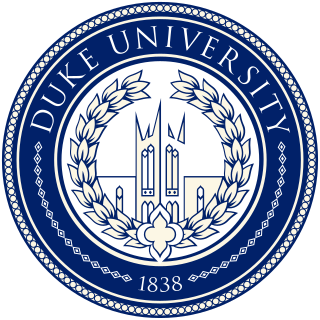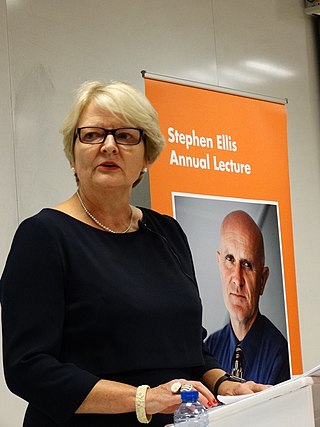Related Research Articles

The University of Prince Edward Island (UPEI) is a public university in Charlottetown, Prince Edward Island, Canada, and the only university in the province. Founded in 1969, the enabling legislation is the University Act, R.S.P.E.I 2000.

Duke University is a private research university in Durham, North Carolina, United States. Founded by Methodists and Quakers in the present-day city of Trinity in 1838, the school moved to Durham in 1892. In 1924, tobacco and electric power industrialist James Buchanan Duke established The Duke Endowment and the institution changed its name to honor his deceased father, Washington Duke.
Trinity College of Arts and Sciences is the undergraduate liberal arts college of Duke University. Founded in 1838, it is the original school of the university. Currently, Trinity is one of three undergraduate degree programs at Duke, the others being the Edmund T. Pratt School of Engineering and Duke Kunshan University.
Christopher Ehret, who currently holds the position of Distinguished Research Professor at UCLA, is an American scholar of African history and African historical linguistics particularly known for his efforts to correlate linguistic taxonomy and reconstruction with the archeological record. He has published ten books, most recently History and the Testimony of Language (2011) and A Dictionary of Sandawe (2012), the latter co-edited with his wife, Patricia Ehret. He has written around seventy scholarly articles on a wide range of historical, linguistic, and anthropological subjects. These works include monographic articles on Bantu subclassification; on internal reconstruction in Semitic; on the reconstruction of proto-Cushitic and proto-Eastern Cushitic; and, with Mohamed Nuuh Ali, on the classification of the Soomaali languages. He has also contributed to a number of encyclopedias on African topics and on world history.
Alfred H. Bloom is an American psychologist and linguist. He was the executive vice chancellor of Duke Kunshan University from 2020 to 2021. Before that, he was the vice chancellor of New York University Abu Dhabi from 2008 to 2019 and the president of Swarthmore College from 1991 to 2009.
Meyer Fortes FBA FRAI was a South African-born anthropologist, best known for his work among the Tallensi and Ashanti in Ghana.
Stephen Douglas Houston is an American anthropologist, archaeologist, epigrapher, and Mayanist scholar, who is particularly renowned for his research into the pre-Columbian Maya civilization of Mesoamerica. He is the author of a number of papers and books concerning topics such as the Maya script, the history, kingships and dynastic politics of the pre-Columbian Maya, and archaeological reports on several Maya archaeological sites, particularly Dos Pilas and El Zotz. In 2021, National Geographic noted that he participated in the correct cultural association assigned to a half-size replica discovered at the Tikal site of the six-story pyramid of the mighty Teotihuacan culture, which replicated its Citadel that includes the original Feathered Serpent Pyramid.

John Anthony Quelch CBE is a British-American academic and professor. Quelch is the executive vice chancellor of Duke Kunshan University in Kunshan, China. He is the former dean of the University of Miami School of Business at the University of Miami in Coral Gables, Florida from 2017 to 2022.
Christopher C. Fennell is an American anthropologist and lawyer, an Assistant Professor of Anthropology at the University of Illinois, Urbana-Champaign. His first book Crossroads and Cosmologies: Diasporas and Ethnogenesis in the New World (2008) received the John L. Cotter Award from the Society for Historical Archaeology. Fennell is editor of the African Diaspora Archaeology Network and Newsletter, and an associate of the editorial board of the International Journal of Historical Archaeology.
Allen Feldman is an anthropologist and professor. He is Professor of Media, Culture, and Communication at the New York University (NYU) Steinhardt School of Culture, Education, and Human Development. He has taught at Central European University in Budapest, the Institute of Humanities Studies in Ljubljana, Slovenia, and in the Department of Performance Studies at NYU. He received a Ph.D. in cultural anthropology at New School for Social Research, where he also received his M.A. and B.A.

Dame Henrietta Louise Moore, is a British social anthropologist. She is the director of the UCL Institute for Global Prosperity at University College, London, part of the Bartlett, UCL's Faculty of the Built Environment.
Gerald F. Schroedl is a professor of anthropology at the University of Tennessee. He specializes in Southeastern United States and Caribbean prehistoric and historic archaeological sites. He is an authority on Cherokee prehistory and the archaeology of eastern Tennessee and western North Carolina.
Mark Paul Leone is an American archaeologist and professor of anthropology at the University of Maryland, College Park. He is interested in critical theory as it applies to archaeology and, particularly, to historical archaeology. He has directed Archaeology in Annapolis since 1981. This project focuses on the historical archaeology of Annapolis and Maryland's Eastern Shore and features the use of critical theory. Leone is committed to public interpretation and teaches his students about the relationship between public interpretation and the politics of archaeology.
Duke Kunshan University is a university in Kunshan, Jiangsu, China. It was established in 2018 by a joint venture between Duke University and Wuhan University. The university is an independent legal entity.
Richard Lewis Burger, Ph.D., is an archaeologist and anthropologist from the United States. He is currently a professor at Yale University and holds the positions of Charles J. MacCurdy Professor in the Anthropology Department, Chair of the Council on Archaeological Studies, and Curator in the Division of Anthropology at the Peabody Museum of Natural History. He has carried out archaeological excavations in the Peruvian Andes since 1975, publishing several books and many articles on Chavin culture, a pre-Hispanic civilization that developed in the northern Andean highlands of Peru from 1000 BC to 400 BC. Burger is married to Lucy Salazar, a Peruvian archaeologist and long time collaborator on many research projects. His former doctoral student Sabine Hyland has become well-known as an Andean anthropologist.
Graham Edward Connah was a British-born archaeologist who worked extensively in Britain, West Africa and Australia.
Brian A. Stewart is an anthropological archaeologist, assistant professor of anthropology, and curator of Paleolithic archaeology at the University of Michigan Museum of Anthropological Archaeology. He is also an honorary research fellow at the Rock Art Institute of the University of the Witwatersrand. His research focuses primarily on prehistoric hunter-gatherer societies of Africa, especially southern Africa. He is particularly interested in determining when, how, and where humans developed adaptive plasticity. Brian Stewart has directed excavations of many sites, mostly in Lesotho and South Africa, among the most notable are Spitzkloof, Sehonghong, and Melikane.
Lynn Meskell is an Australian archaeologist and anthropologist who currently works as a Professor at the University of Pennsylvania.
Akinwumi Ogundiran is the Cardiss Collins Professor of Arts and Sciences and Professor of History at Northwestern University. He is an archaeologist, anthropologist, and cultural historian, whose research focuses on the Yoruba world of western Africa, Atlantic Africa, and the African Diaspora. He was born in Ibadan, Nigeria, and migrated to the United States in 1993. He was Chancellor's Professor and Professor of Africana Studies, Anthropology & History at UNC Charlotte.

Scott M. Fitzpatrick is a Professor in the Department of Anthropology and Curator of Indo-Pacific Archaeology at the Museum of Natural and Cultural History at the University of Oregon. He is a specialist in the prehistory and historical ecology of island and coastal regions of the Pacific and Caribbean. His research has focused on colonization events, seafaring strategies, adaptations to smaller islands, exchange systems, and human impacts on ancient environments. He has conducted archaeological research in the Caribbean and Pacific Islands with other projects having taken place in Panama, the Florida Keys, and Oregon Coast. He has published several books and more than 140 journal articles and book chapters. Fitzpatrick is the founding co-editor of The Journal of Island and Coastal Archaeology, an Associate Editor for Archaeology in Oceania, a Review Editor for Frontiers in Human Dynamics, and serves on the editorial boards for the Caribbean Journal of Science and Journal of Archaeological Science: Reports. Fitzpatrick is also a Research Associate at the National Museum of Natural History, Smithsonian Institution and a Research Affiliate at the Florida Museum of Natural History.
References
- ↑ MacEachern, Scott (June 2000). "Genes, Tribes, and African History". Current Anthropology. 41 (3): 357–384. doi:10.1086/300144. ISSN 0011-3204. PMID 10768880. S2CID 19610649.
- 1 2 "First Group of Faculty Members Awarded Tenure at Duke Kunshan". Duke Kunshan University. Retrieved 2018-10-18.
- ↑ Bradham, Bre (2018-03-22). "As DKU announces new majors for first undergraduate class, faculty discuss freedom that comes with new program". The Chronicle. Retrieved 2018-10-18.
- ↑ Bird, Winifred (2016-07-20). "An Archaeological Mystery In Ghana: Why Didn't Past Droughts Spell Famine?". NPR. Retrieved 2018-10-18.